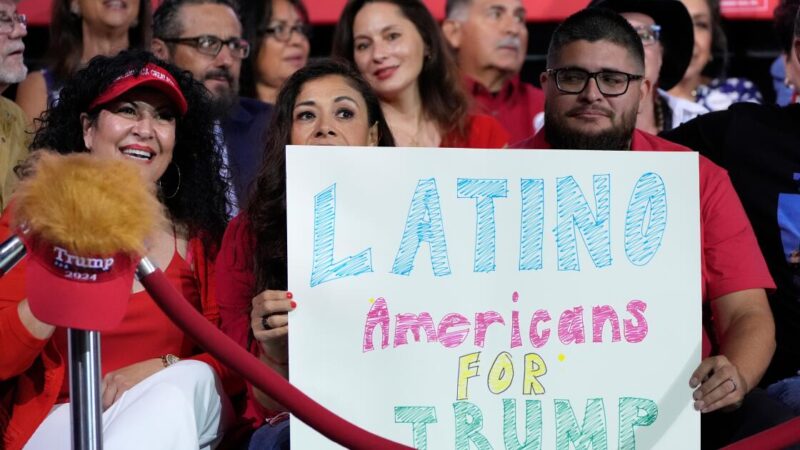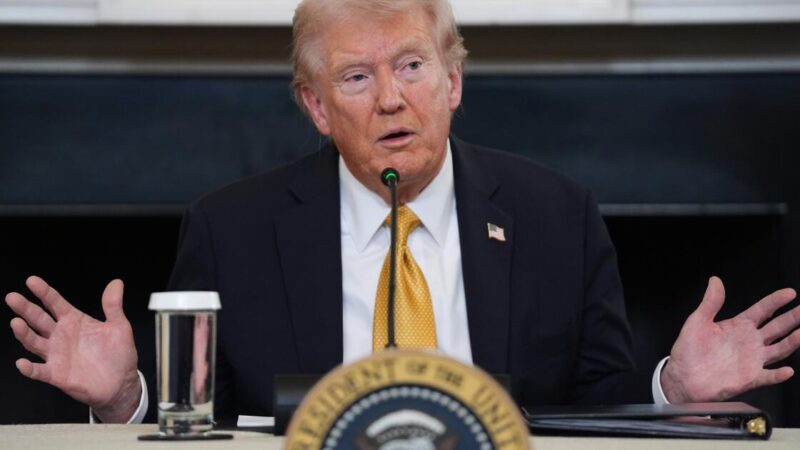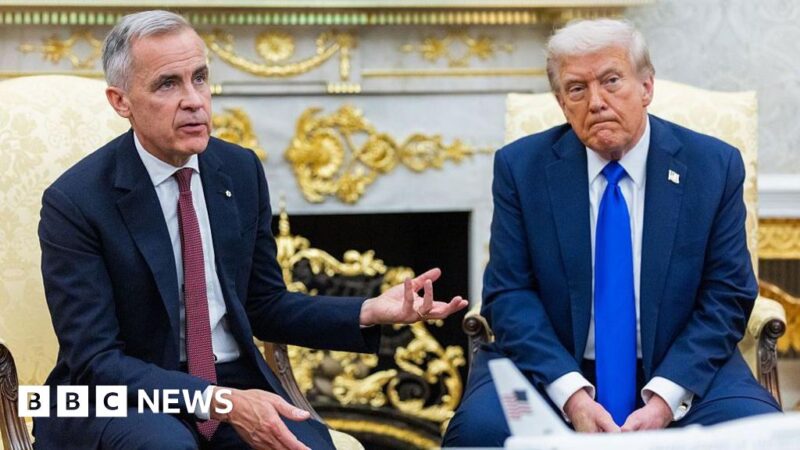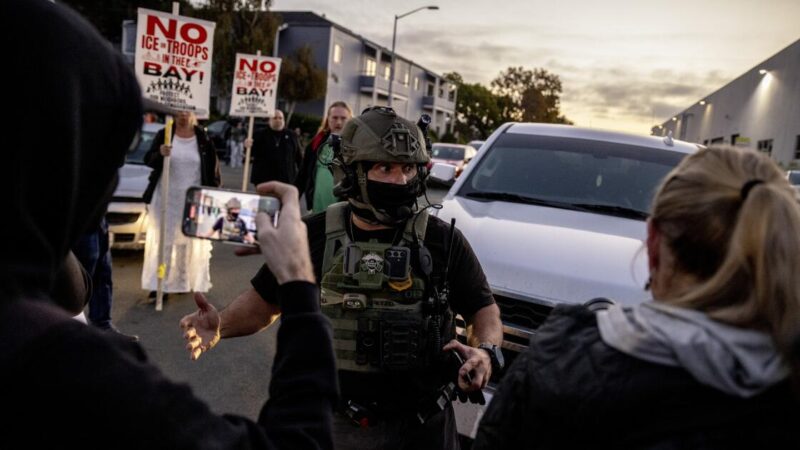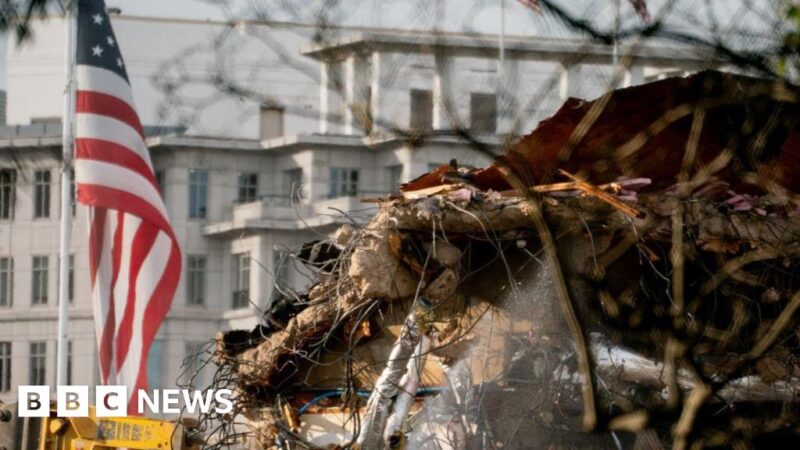Contributor: How Democratic-run cities will stand up against Trump’s declaration of ‘war from within’
Earlier this week during a speech to military leaders at a summit in Quantico, Va., President Trump declared his intention to use Democratic-run cities as “training grounds” for U.S. troops.
“San Francisco, Chicago, New York, Los Angeles, they’re very unsafe places. And we’re going to straighten them out one by one,” Trump said. “This is going to be a major part for some of the people in this room. That’s a war too. It’s a war from within.”
This comes as no surprise to those of us representing American cities — Los Angeles, Washington, D.C., and Chicago — who are already being terrorized by federal armed forces patrolling our streets. Last month, a federal judge reaffirmed what we already know: Setting the military on American cities is a violation of the laws of this country and the rights of its people. And yet, whether they’ve come in the form of an armed National Guard or masked ICE agents, the attacks on our cities and the rights of our residents have continued.
Trump claims these actions are necessary in the name of public safety. However, his justification, like so many of the president’s statements, is a lie. In each of the three cities we represent, crime has dropped dramatically within the past year: Los Angeles is trending toward its lowest homicide rate in 60 years; violent crime in Washington is lower than it has been in decades; and Chicago saw a 40% decline in shootings in the first half of 2025, while violent crime rates overall have dropped to their lowest point in a decade.
This isn’t the first time Trump has hidden behind the lie of public safety to pursue unlawful and un-American actions against our people. Despite his claims that the Department of Homeland Security is rooting out violent criminals, its own data shows that immigrants with no criminal record now represent the largest group in ICE detention.
Those of us who’ve been on the ground, fighting for and alongside our neighbors, have seen the impacts of this xenophobic and un-American agenda firsthand. We’ve been on the front lines as those with deep community ties and no criminal backgrounds are arrested and rounded up, shoved into vans in front of their families. We’ve seen officers target majority-Black and brown neighborhoods with racial profiling so egregious that one D.C. magistrate judge called one unconstitutional action “the most illegal search I have ever seen in my life.”
In Chicago, ICE’s targeting of Latino residents has stretched from Michigan Avenue to the western suburbs including Franklin Park, where their reckless tactics led to the death of Silverio Villegas-Gonzalez.
These people were not a threat to our cities; many of them were pillars of our communities. What is a threat to us is a president with aspirations of dictatorship, who willfully disregards due process and the right of states and cities to govern themselves.
We have seen so far that Congress will do nothing to curb the excesses and abuses of this administration. So it is left to us, as cities and states, to protect our own. During this time when our rights and norms are being continually violated, we must establish new norms, of working together across city and state lines to reassert our rights and protect our neighbors.
In our cities, we have already begun this work. Los Angeles residents are exercising their rights by monitoring ICE agents as they leave hotels and staging areas, so we know where they’re patrolling and who they’re targeting. In D.C., we’re demanding that Mayor Muriel Bowser abandon the failed strategy of appeasement, while also supporting hundreds of hyper-local, community-led rapid response networks. In Chicago, we’ve partnered with neighborhood rapid response networks and community organizations to organize Know Your Rights campaigns so effective that border czar Tom Homan complained that our residents are making ICE agents’ jobs difficult by being “too educated” on their rights under the law.
And all three of our cities are working with each other, alongside counterparts in other cities now threatened by Trump — most recently Portland — to share best practices and strategies for how we can more effectively resist this federal intrusion on our cities and on our rights as Americans.
As local elected officials, we can’t rely on the old playbook to meet this moment — we need to fight with every tool we have, and create new ones. We must drive more people to join rapid response networks in our communities to protect our neighbors from being arrested or disappeared without due process. We must diminish the surveillance infrastructure from our cities that share data with ICE and other federal counterparts. We must show up to accompany constituents to immigration court. We must urge our mayors and governors to balance our budgets without removing critical support to our immigrant neighbors. And we must strategize around all of these efforts with local governments and community organizations across the country, so that we can most effectively fight the intrusion of the federal government on our right to govern ourselves.
During a time when our norms and rights are under attack, local governments can’t fall back on our usual way of doing things: We have to establish new norms. In the absence of action from Congress, it’s up to local communities to reinforce the constitutional rights of our people and to do everything we can to resist the erosion of those rights.
Hugo Soto-Martínez represents the 13th District on the Los Angeles City Council and is chair of its committee on civil rights and immigration. Andre Vasquez is alderperson of the 40th Ward and chair of Chicago’s Committee on Immigrant and Refugee Rights. Janeese Lewis George represents Ward 4 as D.C. Councilmember.
Insights
L.A. Times Insights delivers AI-generated analysis on Voices content to offer all points of view. Insights does not appear on any news articles.
Viewpoint
Perspectives
The following AI-generated content is powered by Perplexity. The Los Angeles Times editorial staff does not create or edit the content.
Ideas expressed in the piece
The authors argue that Trump’s declaration to use Democratic-run cities as military “training grounds” constitutes an illegal and unconstitutional violation of federal law and citizens’ rights. They contend that a federal judge has already ruled such military deployment against American cities unlawful, yet the administration continues these actions through armed National Guard and ICE agents patrolling their streets.
The authors assert that Trump’s public safety justification is fundamentally dishonest, pointing to dramatic crime reductions in their represented cities: Los Angeles trending toward its lowest homicide rate in 60 years, Washington D.C. experiencing violent crime rates lower than seen in decades, and Chicago witnessing a 40% decline in shootings with overall violent crime at decade-low levels. They maintain that federal enforcement actions primarily target immigrants without criminal records rather than addressing legitimate public safety concerns.
The authors characterize Trump as having dictatorial aspirations who willfully disregards due process and the constitutional right of states and cities to govern themselves. They argue that ICE operations employ racial profiling so severe that one D.C. magistrate judge called it “the most illegal search I have ever seen,” while targeting community pillars rather than genuine threats. With Congress failing to check administrative excesses, the authors advocate for cities and states to establish new resistance norms through rapid response networks, ICE monitoring, Know Your Rights campaigns, and inter-city coordination to protect residents and reassert local governance rights.
Different views on the topic
Speaker Mike Johnson defended Trump’s military deployment comments as being “cherry-picked out of a long speech,” arguing that they demonstrate the president’s ability to “take crime seriously” and noting that Trump has “cleaned up the crime problem” in Washington, D.C. after mobilizing the D.C. National Guard[1]. Johnson emphasized his focus on running the House of Representatives rather than Pentagon operations when pressed about military deployment appropriateness[1].
Legal experts and Trump administration officials argue that the deployments rely on legitimate federal authority through an esoteric subsection of federal law that permits the president to federalize troops over state government objections in certain limited circumstances[2]. The 9th Circuit Court of Appeals has found that judges must be “highly deferential” to the president’s interpretation of facts on the ground regarding such deployments[2].
Trump defended his approach by citing historical precedent, stating that “George Washington, Abraham Lincoln, Grover Cleveland, George Bush and others all used the armed forces to keep domestic order and peace”[2]. The administration maintains that Democratic-run cities like New York, Chicago, and San Francisco are “very unsafe places” requiring federal intervention to “straighten them out one by one”[1][2]. Defense officials have positioned these actions within legal frameworks for protecting federal buildings and employees, similar to previous California deployments[1].
